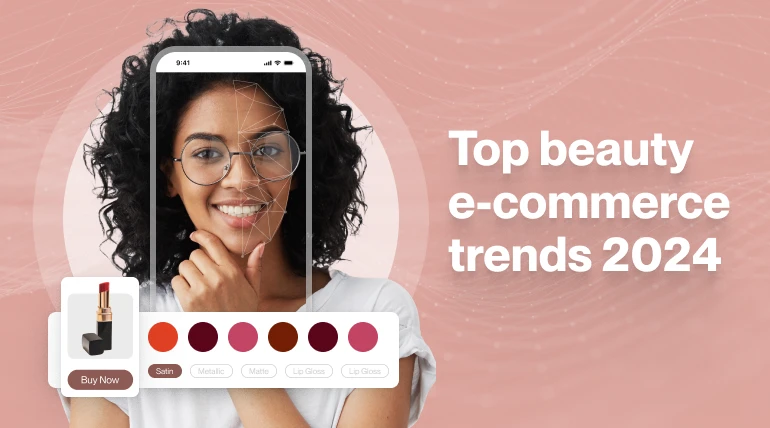With the global beauty industry expected to reach an astonishing $580 billion by 2027, and e-commerce’s share exceeding 20%, this sector stands as a beacon of resilience and potential.
So, in this article, we’ll uncover the most captivating beauty e-commerce trends shaping the future of beauty online. And these include everything from the wonders of AR and AI, through the personalized experiences of hyper-personalization, all the way to sustainability and diversity that have become more than just buzzwords.
Let’s embark on a journey to explore the strategies and innovations that will define the beauty e-commerce industry in 2024.
1. Beauty AR and AI: Beyond virtual try-ons
In the rapidly evolving landscape of beauty e-commerce, AR and AI are not just changing the game; they’re redefining it. These technologies are instrumental in shaping the beauty market that has seen e-commerce nearly quadruple between 2015 and 2022.
With e-commerce now accounting for over 20% of the beauty market, the integration of AR and AI is more crucial than ever.
✧ Personalization at its best
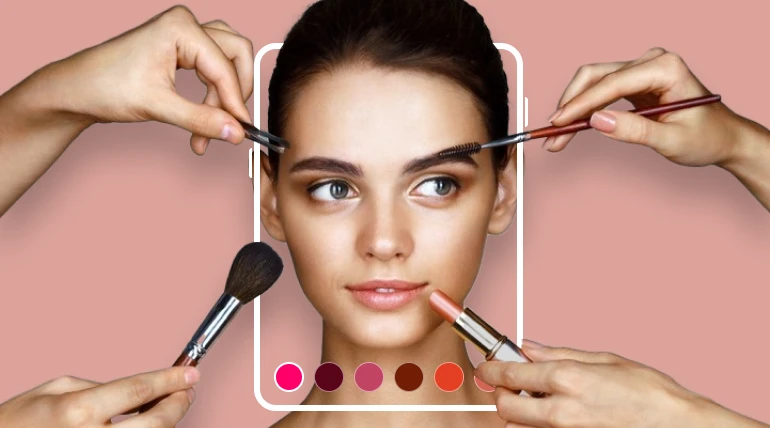
AR and AI technology offer an unprecedented level of personalization in online shopping. By enabling customers to virtually try on products that match their specific preferences, skin tone, or style, this tech is tapping into a customer-centric approach that’s key to the growing e-commerce market.
This personalized experience not only enhances customer satisfaction but also fosters loyalty and drives growth in a market where e-commerce is expected to continue being the fastest-growing sales channel at 12% per year from 2022 to 2027.
✧ Accessibility and convenience redefined
The convenience of AR-powered virtual try-ons is a game-changer for beauty e-commerce. Customers no longer need to visit physical stores to experiment with products. Arbelle’s technology makes beauty e-commerce more inclusive and accessible, breaking down geographical barriers and inviting a broader audience to engage with beauty brands. This ease of access is a significant driving force in expanding your customer base and reaching new markets.
✧ Exploring and discovering new favorites
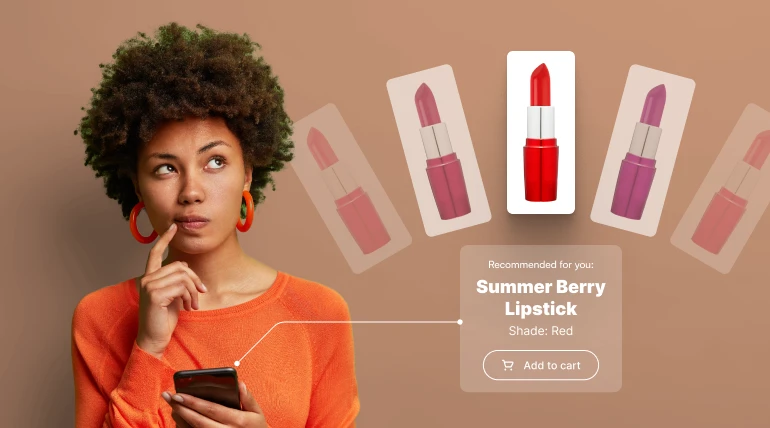
AR features are not just about trying on products; they’re about inspiring customers to explore and discover. This aspect of AR technology encourages customers to step out of their comfort zones, explore new products, and discover new favorites. This exploration leads to exciting discoveries, helping customers find new favorites and, in turn, driving sales for beauty brands.
And in a market where 42% of consumers in a 2023 survey expressed enjoyment in trying new brands, the role of AR in driving sales and diversifying product offerings is increasingly important.
✧ Social sharing and increased brand engagement
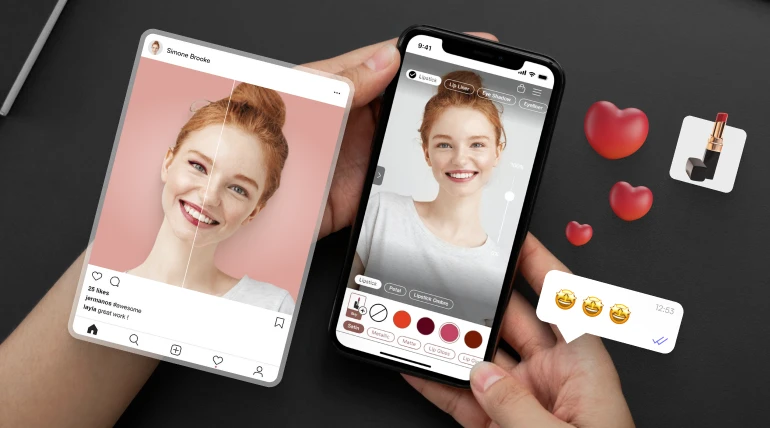
One of the most impactful aspects of AR in beauty e-commerce is its integration with social media. Beauty AR experiences can also include social sharing capabilities, allowing customers to share their virtual makeovers and transformations across platforms.
This not only increases brand visibility but also fosters a sense of community and engagement. The potential for viral marketing through these shared experiences is immense, as each shared post acts as a personal endorsement, reaching a wider audience and attracting new customers.
2. Hyper-personalization: The data-driven approach
While personalization is an intrinsic part of the previously mentioned beauty AR and AI, it deserves even further exploration. Mainly because personalization, or hyper-personalization, is the absolute main consumer demand nowadays – and it encompasses many different aspects.
In the realm of beauty e-commerce trends, hyper-personalization represents a data-driven approach that goes beyond standard product recommendations. It involves analyzing and utilizing customer data to tailor the shopping experience to each individual’s unique needs and preferences.
In this realm, Arbelle stands out by offering advanced AI-driven solutions that delve into the nuances of individual consumer profiles. This includes understanding specific skin types, personal styles and preferences, and even demographic factors that affect product choices. By leveraging this wealth of data, Arbelle can provide recommendations and experiences that are not just personalized but precisely aligned with each customer’s unique beauty journey.
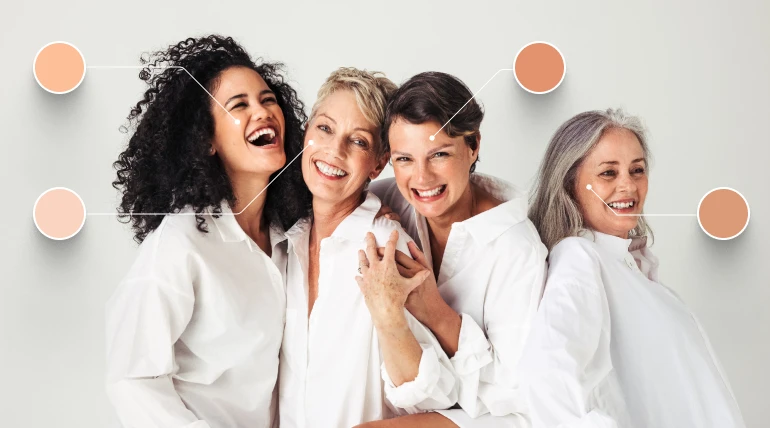
As consumers increasingly seek products and experiences that resonate with their individual identity, hyper-personalization becomes a critical differentiator in the competitive beauty market.
It’s not just about offering a broad range of products anymore. It’s about ensuring that every interaction customers have with a brand is reflective of their specific beauty needs and aspirations.
This level of detail in personalization fosters deeper customer engagement and loyalty. And, ultimately, drives sales in an industry where tailored experiences are rapidly becoming the norm rather than the exception.
In 2024, as the beauty e-commerce landscape continues to evolve, the brands that succeed will be those that embrace hyper-personalization as a core part of their strategy.
Arbelle, with its cutting-edge technology and commitment to deeply personalized experiences, is well-positioned to lead this charge, helping beauty brands connect with their customers in the most meaningful and impactful ways.
3. Sustainable and clean beauty: Beyond the buzzword
Sustainable and clean beauty has transcended its status as a mere buzzword, evolving into a defining movement within the beauty industry. This shift is reflected in significant and changing consumer attitudes:
-
- A Nielsen survey reveals that 73% of consumers are willing to change their consumption habits to lessen their environmental impact.
-
- Furthermore, NIQ’s 2023 sustainability study underscores this trend, indicating that 69% of consumers now prioritize sustainability more than they did two years ago, although challenges like cost and accessibility persist.
-
- Moreover, an overwhelming 76% of consumers – that’s 3 in 4 consumers – expect companies to reduce their environmental footprints proactively.
So, the message is clear: sustainability is not just preferred; it is demanded.
In this context, AI and AR technologies are playing a pivotal role in bridging the gap between consumer demand for sustainability and the practical challenges of adopting clean beauty practices.
Arbelle’s beauty AR capabilities further enhance this trend by providing a virtual try-on experience that reduces the need for physical product samples and packaging, thereby minimizing waste. This approach not only caters to the growing demand for sustainable and clean beauty solutions but also addresses the challenges related to cost and accessibility by allowing consumers to explore and experiment with products in a cost-effective and environmentally friendly manner.
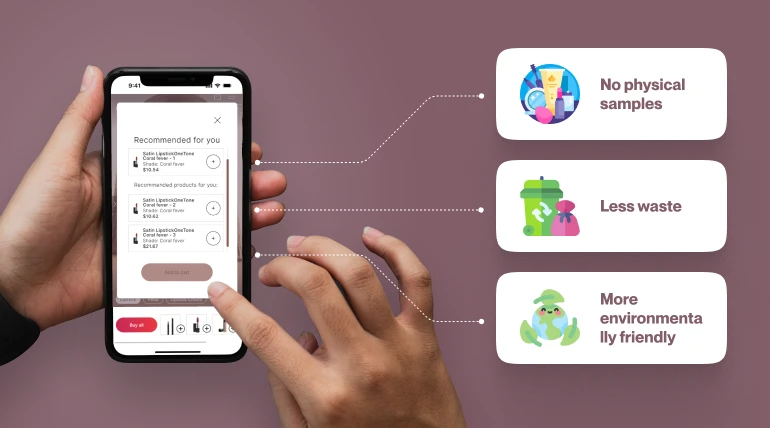
Moreover, this results in decreased product returns, because providing accurate, personalized product recommendations reduces the likelihood of returns. And in addition, using AI for better stock management can minimize overproduction and waste.
Arbelle’s implementation of AI and AR technologies is at the forefront of this transformation. By providing personalized recommendations that align with consumers’ environmental values and offering virtual try-on experiences, Arbelle is making sustainable and clean beauty choices more accessible and appealing. These technologies not only cater to the consumer’s demand for sustainability but also tackle practical challenges head-on. This makes it easier for consumers to engage with clean beauty brands without compromising convenience or personal values.
All in all, we can say that the integration of AI and AR in the clean beauty sector is revolutionizing the way brands meet consumer demands for sustainability. And as we move forward, the role of technology in promoting sustainable practices within the beauty industry will undoubtedly grow.
4. Diversity and inclusion: Reflecting real beauty
In today’s beauty industry, a transformative shift toward diversity and inclusion is underway, marking a pivotal moment in how real beauty is recognized and celebrated.
And so, the critical importance of showcasing a comprehensive array of skin tones, genders, ages, and body types in product ranges and marketing cannot be overstated. Brands that commit to this diversity are not only championing inclusivity this way but also engaging with a wider audience, thereby fostering a beauty industry where every consumer feels seen and valued.
At the forefront of this inclusive revolution is Arbelle’s Shade Finder. It’s a groundbreaking tool leveraging the Monk Skin Tone Scale to offer the first truly inclusive virtual foundation shade finder.
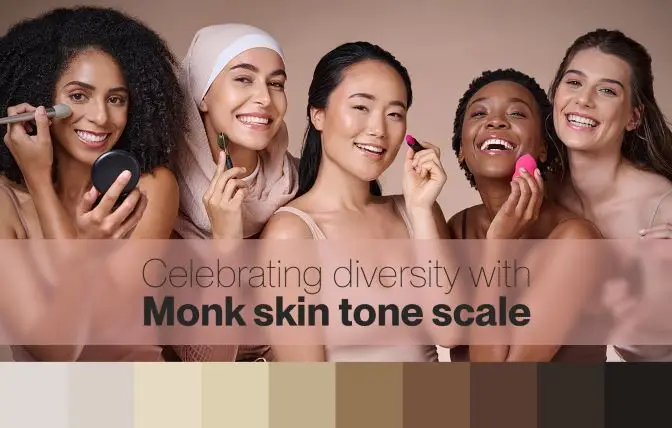
This innovation is a direct response to the pressing need for products that cater to an underserved market. A significant study by McKinsey & Company sheds light on the disparities within the beauty sector, revealing that Black consumers are 5.7 times more dissatisfied than non-Black consumers with makeup products and services, and 2.9 times more dissatisfied with skincare.
➥ These figures highlight the urgent demand for more inclusive beauty solutions that accurately reflect the diverse beauty of all consumers.
Arbelle’s innovative approach with the Shade Finder tool is a shining example of how technology can be leveraged to promote diversity and inclusion within the beauty industry. By providing a solution that accurately matches a wide range of skin tones, Arbelle is directly addressing the disparities highlighted in the McKinsey research and is setting a new standard for inclusivity.
This technology thus significantly enhances the shopping experience for all consumers. But it also plays a crucial role in building a beauty industry that truly reflects the diversity of its audience.
Overall, this movement towards greater diversity and inclusion within the beauty industry is a trend that goes beyond mere representation. It’s about creating a space where everyone can find products that speak to their individual beauty.
Arbelle’s commitment to this cause, particularly through its Shade Finder, exemplifies the potential of technology to bridge gaps and foster a more inclusive beauty landscape. As the industry continues to evolve, embracing diversity and inclusion will remain paramount. And Arbelle is leading the way in reflecting real beauty in all its diversity.
Embrace the future and navigate beauty e-commerce trends with Arbelle
As we journey through the transformative landscape of the beauty e-commerce trends in 2024, it’s clear that the industry is on the cusp of a new era.
From the innovative uses of AR and AI in creating personalized, virtual try-on experiences to the drive towards sustainability and clean beauty, the beauty e-commerce trends shaping this space are both exciting and essential for the future.
Moreover, the commitment to diversity and inclusion, as championed by Arbelle’s Shade Finder, underscores a broader shift towards an industry that celebrates beauty in all its forms.
So, we invite you to join us on this journey. Discover how Arbelle’s technologies can transform your brand and connect with your audience in ways you never thought possible. Contact us today, and let’s shape the future of your beauty e-commerce together.
Boost your brand with Arbelle
Let us help you discover how beauty AI and AR trends in e-commerce can get your brand to the next level.
